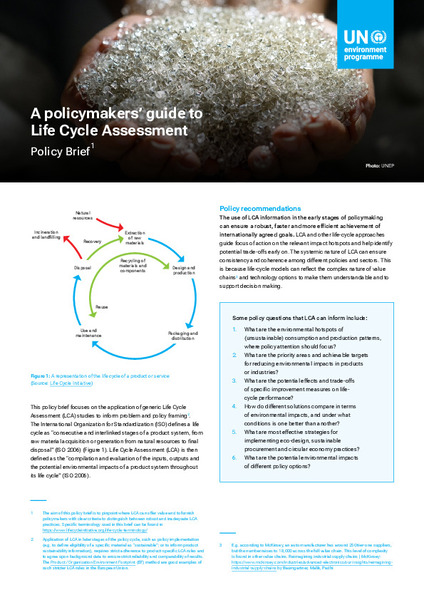| dc.contributor | Industry and Economy Division | en_US |
| dc.contributor.author | United Nations Environment Programme | en_US |
| dc.coverage.spatial | Global | en_US |
| dc.date.accessioned | 2024-10-29T12:32:20Z | |
| dc.date.available | 2024-10-29T12:32:20Z | |
| dc.date.issued | 2024-11 | |
| dc.identifier.uri | https://wedocs.unep.org/20.500.11822/46469 | |
| dc.description | This policy brief focuses on the application of generic Life Cycle Assessment (LCA) studies to inform problem and policy framing.
The International Organization for Standardization (ISO) defines a life cycle as “consecutive and interlinked stages of a product system, from raw material acquisition or generation from natural resources to final disposal” (ISO 2006) (Figure 1). Life Cycle Assessment (LCA) is then defined as the “compilation and evaluation of the inputs, outputs and the potential environmental impacts of a product system throughout its life cycle” (ISO 2006). | en_US |
| dc.format | pdf | en_US |
| dc.language | English | en_US |
| dc.publisher | United Nations Environment Programme | en_US |
| dc.rights | Public | en_US |
| dc.subject | life cycle | en_US |
| dc.subject | sustainable consumption | en_US |
| dc.subject | resource efficiency | en_US |
| dc.subject | policy making | en_US |
| dc.title | A Policymakers’ guide to Life Cycle Assessment - Policy Brief | en_US |
| dc.type | Briefs, Summaries, Policies and Strategies | en_US |
| wd.identifier.sdg | SDG 12 - Responsible Consumption and Production | en_US |
| wd.topics | Finance and Economic Transformations | en_US |
| wd.identifier.pagesnumber | 6 p. | en_US |



